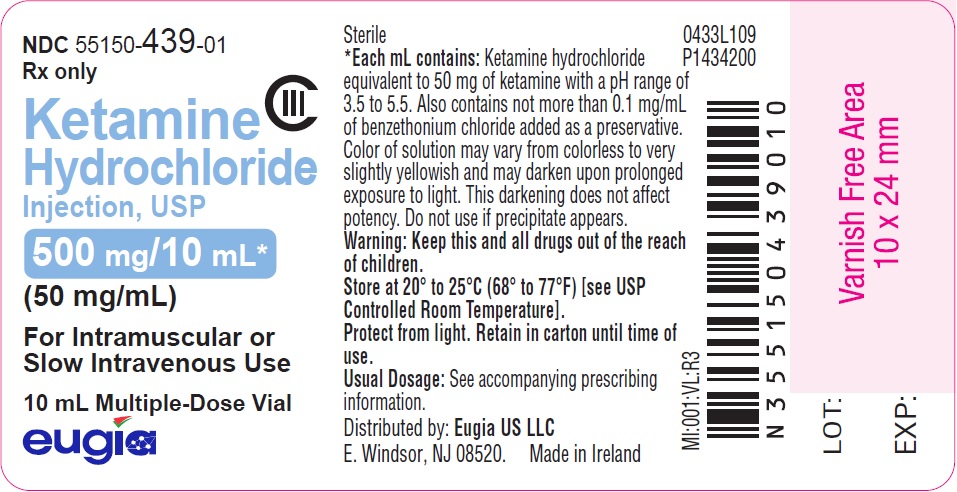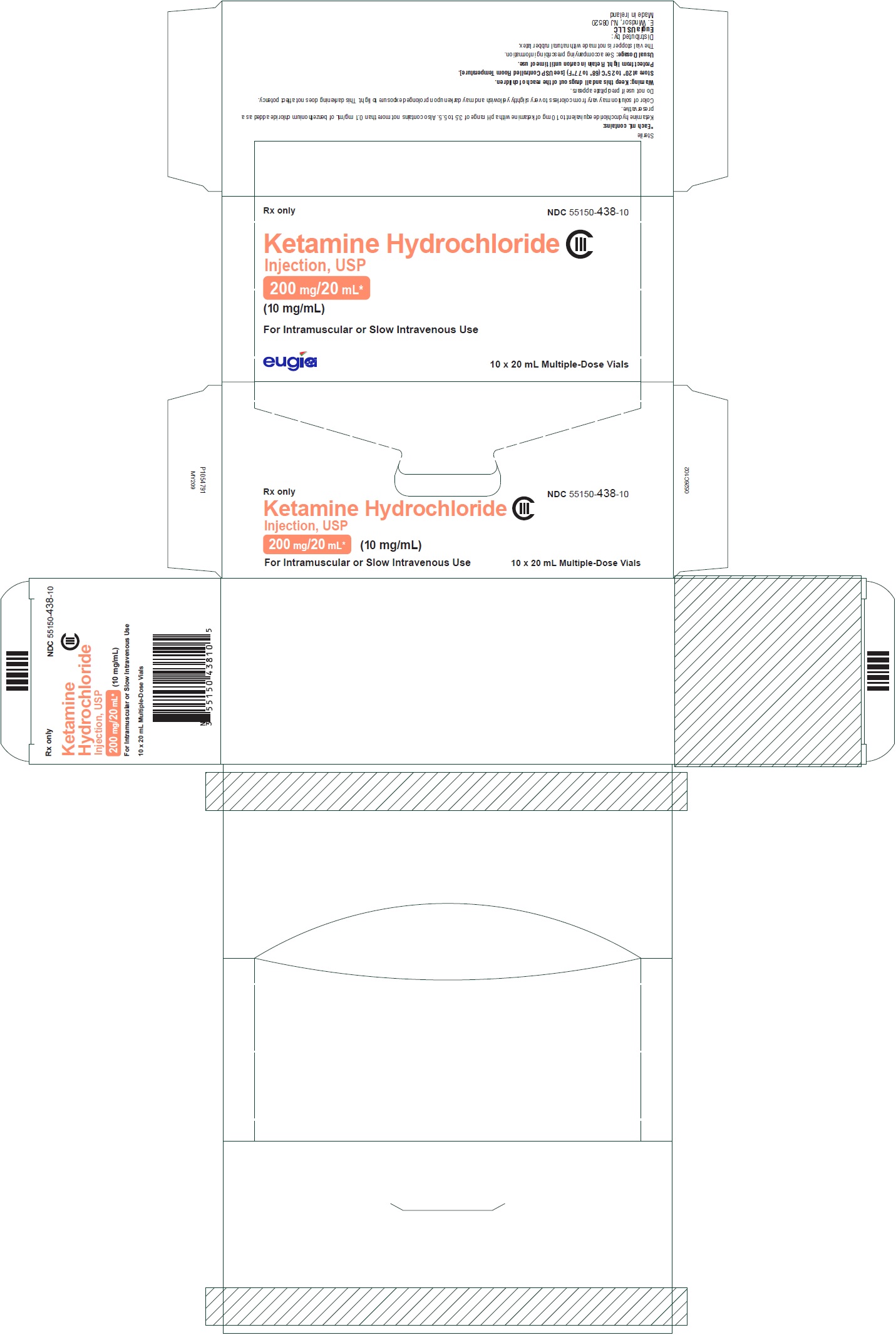Ketamine
What is ketamine used for?
Ketamine is a prescription medicine that is used to cause sleep during a procedure. It is used to put you to sleep for surgery. Ketamine may be given to you for other reasons.
Description
Ketamine hydrochloride injection, USP for intravenous or intramuscular use, contains ketamine, a nonbarbiturate general anesthetic. Ketamine hydrochloride, USP is a white crystalline powder and has a molecular formula of C13H16ClNO•HCl and a molecular weight of 274.19. The chemical name for ketamine hydrochloride is dl-2-(o-Chlorophenyl)-2-(methylamino) cyclohexanone hydrochloride. The chemical structure of ketamine hydrochloride is:

It is formulated as a slightly acidic (pH 3.5 to 5.5) sterile solution for intravenous or intramuscular injection. Each milliliter (mL) of the multiple-dose vials contain either 10 mg ketamine base (equivalent to 11.53 mg ketamine hydrochloride), 50 mg ketamine base (equivalent to 57.67 mg ketamine hydrochloride) or 100 mg ketamine base (equivalent to 115.33 mg ketamine hydrochloride) and not more than 0.10 mg/mL benzethonium chloride added as a preservative in water for injection. The 10 mg/mL solution has been made isotonic with 6.60 mg sodium chloride.
Mechanism of Action
Ketamine hydrochloride, a racemic mixture of ketamine, is a non-selective, non-competitive antagonist of the N-methyl-D-aspartate (NMDA) receptor, an ionotropic glutamate receptor. The major circulating metabolite of ketamine (norketamine) demonstrated activity at the same receptor with less affinity. Norketamine is about 1/3 as active as ketamine in reducing halothane requirements (MAC) of the rat.
Before taking ketamine, tell your doctor:
- If you are allergic to ketamine; any part of this medicine; or any other drugs, foods, or substances. Tell your doctor about the allergy and what signs you had.
- If you have any of these health problems: Aneurysm, chest pain, high blood pressure, raised pressure in the brain, mental illness, overactive thyroid gland, or weak heart.
This is not a list of all drugs or health problems that interact with ketamine.
Tell your doctor and pharmacist about all of your drugs (prescription or OTC, natural products, vitamins) and health problems. You must check to make sure that it is safe for you to take ketamine with all of your drugs and health problems. Do not start, stop, or change the dose of any drug without checking with your doctor.
What are some things I need to know or do while I take ketamine?
- Tell all of your health care providers that you take ketamine. This includes your doctors, nurses, pharmacists, and dentists.
- Avoid driving and doing other tasks or actions that call for you to be alert for 1 full day after getting ketamine and until the effects of ketamine have worn off.
- Talk with your doctor before you drink alcohol or use other drugs and natural products that slow your actions.
- Check your blood pressure as you have been told.
- Some people may need to have heart function tests while taking ketamine. If you have questions, talk with the doctor.
- Mental problems have happened with ketamine as ketamine wears off. These problems may range from pleasant, dream-like states to hallucinations, change in how you act, or confusion. Most of the time, these problems last up to 2 hours but may last up to 24 hours after using ketamine. Be sure to have an adult you can trust watch and help you for up to 24 hours after you get ketamine. Talk with your doctor.
- If you are 65 or older, use ketamine with care. You could have more side effects.
- Studies in young animals and children have shown that frequent or long-term use of anesthesia drugs or drugs used for sleep in children younger than 3 years of age may lead to long-term brain problems. This may also happen in unborn babies if the mother uses ketamine during the third trimester of pregnancy. Talk with the doctor.
- Use with care in children. Talk with the doctor.
- Tell your doctor if you are pregnant or plan on getting pregnant. You will need to talk about the benefits and risks of using ketamine while you are pregnant.
- Tell your doctor if you are breast-feeding. You will need to talk about any risks to your baby.
How is ketamine best taken?
Use ketamine as ordered by your doctor. Read all information given to you. Follow all instructions closely.
- It is given as a shot into a muscle or vein.
- It is given as an infusion into a vein over a period of time.
What do I do if I miss a dose?
- This medicine is given on an as needed basis.
What are the side effects of ketamine that I need to call my doctor about immediately?
WARNING/CAUTION: Even though it may be rare, some people may have very bad and sometimes deadly side effects when taking a drug. Tell your doctor or get medical help right away if you have any of the following signs or symptoms that may be related to a very bad side effect:
- Signs of an allergic reaction, like rash; hives; itching; red, swollen, blistered, or peeling skin with or without fever; wheezing; tightness in the chest or throat; trouble breathing, swallowing, or talking; unusual hoarseness; or swelling of the mouth, face, lips, tongue, or throat.
- Signs of high or low blood pressure like very bad headache or dizziness, passing out, or change in eyesight.
- Trouble breathing, slow breathing, or shallow breathing.
- Slow heartbeat.
- A heartbeat that does not feel normal.
- Feeling confused.
- Hallucinations (seeing or hearing things that are not there).
- Change in how you act.
- Muscle stiffness.
- Seizures.
- Change in eyesight.
- Not able to control eye movements.
What are some other side effects of ketamine?
All drugs may cause side effects. However, many people have no side effects or only have minor side effects. Call your doctor or get medical help if any of these side effects or any other side effects bother you or do not go away:
- Feeling sleepy.
- Not hungry.
- Upset stomach or throwing up.
These are not all of the side effects that may occur. If you have questions about side effects, call your doctor. Call your doctor for medical advice about side effects.
You may report side effects to the FDA at 1-800-332-1088. You may also report side effects at https://www.fda.gov/medwatch.
If overdose is suspected:
If you think there has been an overdose, call your poison control center or get medical care right away. Be ready to tell or show what was taken, how much, and when it happened.
How do I store and/or throw out ketamine?
- If you need to store ketamine at home, talk with your doctor, nurse, or pharmacist about how to store it.
Label
PACKAGE LABEL-PRINCIPAL DISPLAY PANEL- 200 MG/20 ML (10 MG/ML) – CONTAINER-CARTON
- Rx only NDC 55150-438-10
Ketamine Hydrochloride CIII
Injection, USP
200 mg/20 mL*
(10 mg/mL)
For Intramuscular or Slow Intravenous Use
AUROMEDICS 10 x 20 mL Multiple-Dose Vials
PACKAGE LABEL-PRINCIPAL DISPLAY PANEL- 500 MG/10 ML (50 MG/ML) – CONTAINER LABEL
- NDC 55150-439-01
Rx only
Ketamine CIII
Hydrochloride
Injection, USP
500 mg/10 mL*
(50 mg/mL)
For Intramuscular or
Slow Intravenous Use
10 mL Multiple-Dose Vial
AUROMEDICS

SRC: NLM .

